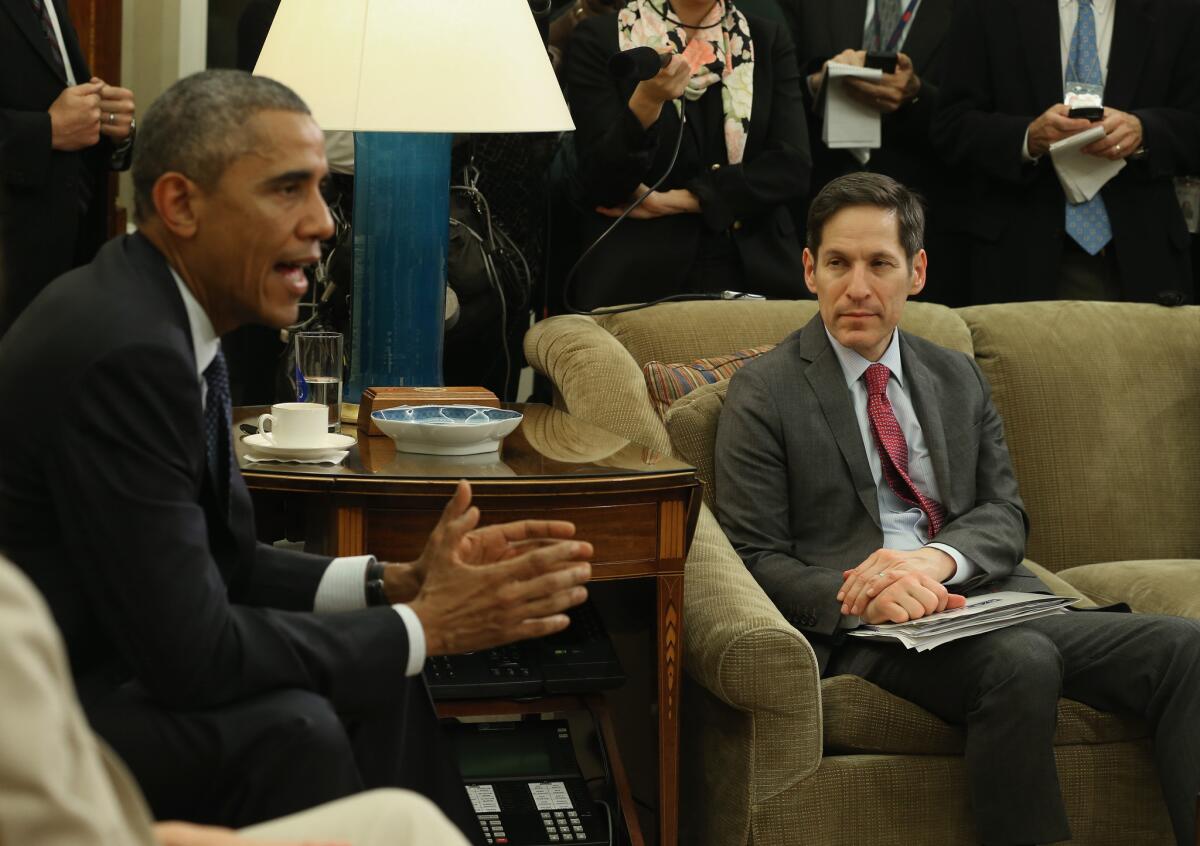Column: A political crisis called Ebola

President Obama, alongside the CDC’s Tom Frieden, speaks to the media about the fight against the Ebola virus during a meeting with his Ebola Response Team in the Oval Office.
- Share via
Until last week, Ebola was merely a humanitarian disaster and a threat to global health. Now it’s a U.S. political crisis too.
And that’s not just because of the heightened vitriol between the two parties in an election year. The Obama administration’s handling of the Ebola crisis has prompted legitimate questions.
“We will stop it in its tracks,” Dr. Thomas Frieden, director of the Centers for Disease Control and Prevention, promised two weeks ago, after a Liberian man in Dallas became the first patient to be diagnosed with the disease in the U.S.
But the disease wasn’t stopped in its tracks.
The bungling wasn’t only at the local level; someone at Frieden’s CDC apparently told nurse Amber Vinson, who treated the Liberian and has since been diagnosed with Ebola herself, that it was OK to fly back from Ohio to Dallas despite her 99.5-degree temperature.
It would have been dereliction of duty, not to mention political malpractice, for Republicans not to demand accountability from the president. And that’s a responsibility they’re happy to assume in these final weeks before the midterm elections. Members of a GOP-led House committee abandoned the campaign trail en masse Thursday to hold a three-hour hearing in Washington, mostly to interrogate Frieden.
A few Democrats have tried to use the issue too, by charging that GOP budget cuts made the problem worse. But their evidence is shaky, and Republicans have had an easier argument to make. Their legitimate complaints fit neatly into their existing narrative that the Obama administration is weak in managerial skill.
And Republicans have come up with an easy-to-grasp policy proposal, quickly endorsed by a flock of Republican candidates for the U.S. Senate: Just stop anyone from Liberia, Guinea or Sierra Leone from traveling to the United States.
Easy to grasp, and probably good politics — but bad policy.
In response to the clamor for restricting entrance to the country, Frieden has repeated an objection he has offered before: “If we do things that unintentionally make it harder to get [medical personnel and supplies] in,” he said, “… it’s going to become much harder to stop the outbreak at the source,” which “ would increase rather than decrease the risk to Americans.”
Here’s what Frieden was too politic to say: The federal government estimates that about 9,000 people from Liberia, Guinea and Sierra Leone have entered the United States during the last two months. And if that one case hadn’t been mishandled in Dallas, leading to the infection of two nurses, we wouldn’t be treating this as a domestic crisis at all. Even now, three cases do not a pandemic make.
The law of averages — and the spread of the virus in Africa — means there will almost surely be more cases. But if travelers can be screened properly and hospital procedures tightened, a travel ban isn’t necessary yet.
Those are big ifs, though. Four of the five U.S. airports that receive most arrivals from Africa didn’t begin screening passengers for Ebola until last week — and Brussels’ international airport, a major link to West Africa, still isn’t screening anyone at all. And even with screening in place, cases will be missed, since the disease has an incubation period of up to three weeks before the onset of symptoms such as fever.
Still, President Obama seems to have finally taken in that Americans want action. He abruptly canceled a campaign trip, something he didn’t do when pro-Russia militiamen shot down an airliner over Ukraine or when Islamic State’s gunmen surged into Iraq. He summoned his secretary of State and secretary of Defense to a full-dress meeting in the Cabinet room. And he appointed an Ebola czar, Ron Klain, a former chief of staff to Vice President Joe Biden.
It all looked mostly like symbolism, and it’s unlikely to satisfy Republicans, a majority of whom, polling shows, don’t think the federal government is up to the challenge. But it was better than nothing.
Ebola isn’t out of control in the United States; far from it. But fear builds a negative bias into our judgments.
Remember when the BP oil spill was cited as evidence that Obama couldn’t govern? And when his administration was under fire for a seemingly unstoppable flood of child immigrants? Those sentiments eased, and these new ones are likely to ease too.
But not until after the 21-day incubation period for those potentially exposed to nurse Amber Vinson runs out, which means not until after the midterm elections. And that makes Ebola a political crisis — for the Democrats at least.
doyle.mcmanus@latimes.comTwitter: @DoyleMcManus
Follow the Opinion section on Twitter @latimesopinion
More to Read
A cure for the common opinion
Get thought-provoking perspectives with our weekly newsletter.
You may occasionally receive promotional content from the Los Angeles Times.










